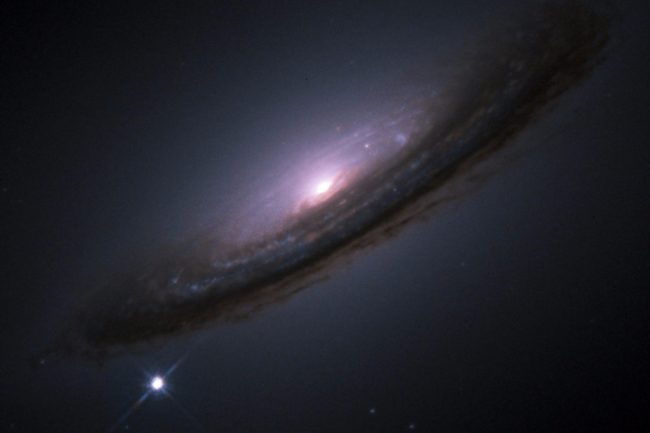Type Ia Supernova 1994D taken by the Hubble | NASA/ESA, CC BY 3.0
Five years ago, three scientists won the Nobel prize for discovering that the universe isn’t just expanding, but that that expansion is accelerating for reasons unkown. And now that discovery is a little less certain than it was.
According to a new paper published this week in Nature Scientific Reports, a team of European researchers have found that their data “are still quite consistent with a constant rate of expansion” [emphasis mine], as opposed to the accelerating rate of expansion that requires the existence of dark energy to push against the force of gravity.
Basically, to determine the rate the universe is expanding at, researchers have been looking at a type of supernova called a Type Ia Supernova, which has some very specific properties. That is, they’re stellar explosions that are basically identical to one another. Because of this “standardized” nature (which arises thanks to some pretty interesting physics that I don’t fully understand) the light they emit can be used as a kind of universal measuring stick to help us determine the size and expansion rate of the universe.
The data from the original studies was from the Hubble’s work back in the 1990s — but there’s a bigger database of over 700 Type Ia Supernovae now, and that’s what this latest paper analyzes.
What they discovered is that, when you look at this larger dataset a certain way (using a more recently-devised model of the universe that basically says all of space isn’t totally uniform — and that’s not a small difference) you find that the argument for an accelerating expansion becomes a lot less convincing.
Now it should be said that this new paper does not disprove the accelerating expansion of the universe. What it does is lower the confidence we can have in the earlier result. Originally they could make their assertions with the standard confidence level of “5 sigma,” — “if the results were due to chance and the experiment was repeated 3.5 million times then it would be expected to see the strength of conclusion in the result no more than once.” But now, according to Prof. Subir Sarkar of Oxford University (the team’s leader) that confidence is down to “at most” a level of “3 sigma.”
Three sigma’s not nothing, though. While a 5 sigma stands an almost unimaginably small possibility of being chance, 3 sigma still means your conclusions are roughly 99.7% likely to be real. That said, as phys.org points out, the “new particle” they thought they might have discovered over at CERN this year had a higher sigma value than that, and it turned out to be noise (which is why we usually assign a 5 or 6 sigma standard to make big claims).
So what does this mean? Well, it’s early days yet, and the standard model of the universe seems to work rather well with accelerating expansion, so it could just be that we haven’t got enough data to be 100% certain yet. Or Prof. Sarkar and his team might be right, and the universe isn’t expanding faster and faster every year. At this point, only time will tell, but the European Extremely Large Telescope now being built in Chile is set to start operating in 2024 and it should be able to provide a massive amount of new data for analysis.
This is just how science works.
For more on the story, you can check out phys.org or else the paper itself, “Marginal evidence for cosmic acceleration from Type Ia supernovae,” over at the journal Nature Scientific Reports. And if you want to know more about sigma values, check out this post over at the Curious Astronomer, which I reference at least a few times a year to remind myself how this all works.
***
Thanks for reading! Except for the very *very* occasional tip (we take Venmo now!), I only get paid in my own (and your) enthusiasm, so please like This Week In Tomorrow on Facebook, follow me on Twitter @TWITomorrow, and tell your friends about the site!
If you like our posts and want to support our site, please share it with others, on Facebook, Twitter, Reddit — anywhere you think people might want to read what we’ve written. If there’s something you think we’ve missed or a story you’d like to see covered, drop us a line! Thanks so much for reading, and have a great week.
***
Richard Ford Burley is a human, writer, and doctoral candidate at Boston College, as well as an editor at Ledger, the first academic journal devoted to Bitcoin and other cryptocurrencies. In his spare time he writes about science, skepticism, feminism, and futurism here at This Week In Tomorrow.

